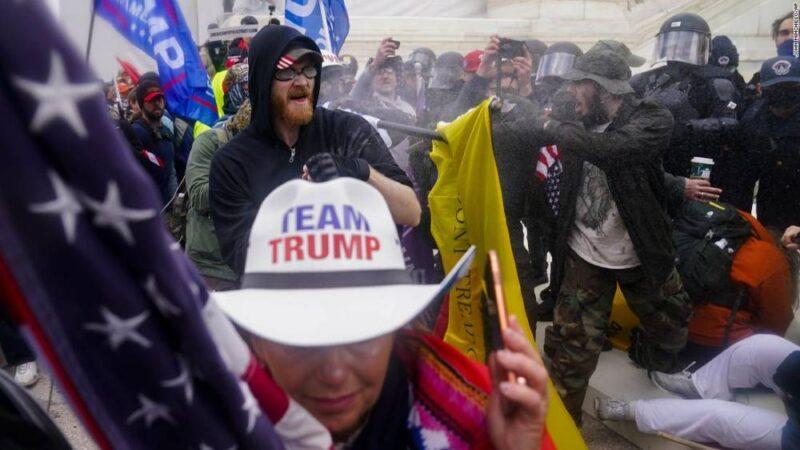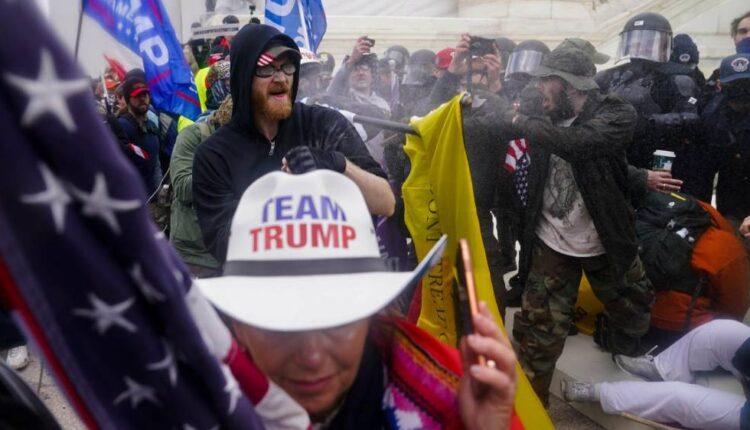(CNN)It was an Extremely Online riot.
Some of the people who stormed the Capitol on Wednesday, stalked its majestic halls, and delayed the certification of Joe Biden’s victory were pro-Trump internet personalities, and others were their fans.Rioters livestreamed their crimes, took selfies to commemorate the occasion, and chatted about their experiences later on social media services.Elle Reeve, a CNN correspondent who has been covering the far right in the United States for many years, felt like she was seeing online extremism in person, streaming down the avenues of official Washington.”People say Donald Trump plus the Internet brings out the extremists,” Reeve said. “But I think the reality is an inversion of that: that Donald Trump plus the Internet brings extremism to the masses. There are many more regular people now who believe extreme things” — for example, the inane belief that “there’s a secret cabal of pedophiles at the very top of the American government.”Read More

Now it's sinking in: Wednesday's Capitol Hill riot was even more violent than it first appearedAs Reeve interviewed some of the Trump supporters who descended on Washington, she saw that they defied the “tinfoil hat man somewhere in a cabin” stereotype of conspiracy theorists.”These were not Internet basement dwellers,” she said. “These are people with jobs … I don’t think, as a culture, we’ve grappled with the way social media is a brainwashing machine.”I interviewed Reeve for more than an hour for this week’s “Reliable Sources” podcast, and asked her to recount her Wednesday reporting experience from start to finish. Reeve interviewed attendees at the so-called “Save America March” where Trump spoke in the morning, then headed toward the Capitol as rallygoers sought to protest Biden’s certification. The protest devolved into a riot.”I don’t think there are enough words in English to describe the way emotion works in a mob like that,” she said. “It’s like an electrical current. It’s joy, but it’s menacing. And there’s also this forward momentum that’s just unstoppable.””Because this was an older crowd,” she added, “it was even all the more jarring. I mean, I think even on a basic level, you know, like what you learn as a kid, like respect your elders, it is shocking to see people who could be your parents scrambling over walls, acting crazy, acting immorally.”And it seemed like almost everyone was recording almost everything.”Everyone is making media at all times,” she said. “It’s crazy. It’s like ‘Were you there if you didn’t livestream it?’ And they’re all hoping for that viral moment that will give them more clout on social media.”Reeve said she read a set of conversations in the Telegram app among QAnon adherents “who were saying, like, ‘We came here to be videotaped, to be recorded.'”Those recordings may now serve as evidence for the law enforcement authorities who are arresting suspected rioters.

The day America realized how dangerous Donald Trump is While working for Vice in 2017, Reeve covered the Unite the Right rally in Charlottesville. Reeve and her photojournalist colleagues captured up-close footage of hateful chants like “Jews will not replace us.”When I brought it up, Reeve agreed that Charlottesville and the Capitol riot could be viewed as bookends of the Trump presidency, but she said the difference in DC on Wednesday was the massive scale.”Most of the people here do not think of themselves as white nationalists,” she said. “Do not want to be seen as racist. I’ve interviewed a lot of them and they’re like, ‘We want nothing to do with those guys.’ But that said, the parallels are, when this huge swarm of people who’ve been active online finally get to meet each other in person. And there’s this thrill of it and it’s very high energy -— but they’ve also been anonymous for so long — it kind of relieves them of the responsibility for their actions.”The phrase “Extremely Online,” as defined by The Daily Dot website, means “to be familiar, even obsessed, with the things everyone is talking about.”It sometimes has a more sinister connotation — referring to groups like QAnon adherents who spend huge amounts of time on social networks and get sucked down digital rabbit holes.Reeve said that “as someone who grew up on the internet, it has been a real adjustment to listen to men in their 50s talk very seriously about memes and fighting the meme war and making all these jokes from the internet.”

DOJ announces charges against man carrying Pelosi's podium and others in US Capitol riot I asked Reeve about the ways that information flows through the pro-Trump internet. She said it’s “organic,” like a web or a network.”There’s a lot of playing around with these radical ideas as jokes,” she said. “And if someone pushes back on you, you can say, ‘Well, it was just a joke. I don’t want a civil war.’ But those seeds get planted in their minds.”Reeve found that most of the people she interviewed on Wednesday said they expected Trump to be sworn in for a second term. “Some people I talked to even said they expected military tribunals of Joe Biden and other Democrats for election fraud,” she said.Other attendees were much more reality-based.During her interviews before the riot began, Reeve also asked, “Do you consider yourself the mainstream of the Republican Party?””And most people said yes,” she recalled. “Maybe a quarter or a third said no or, that they wanted it to be, but most people said yes.”When I asked which interviews stuck with her the most, she recounted “this man screaming at me that they had no choice, that this was their only choice” — to attack the Capitol and disrupt the certification. “I mean, he sincerely believes that,” she said. “He believes that down to his bones. And that was really disturbing.”Reeve said she will also remember “the people who were shocked they’d been Maced, because it was like they were shocked that the police would try to stop them from doing this.”
Source: edition.cnn.com

